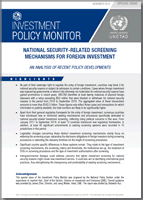
-
As part of their sovereign right to regulate the entry of foreign investment, countries may block it for national security reasons or subject its admission to certain conditions. Cases where foreign investment was rejected by governments or where it did otherwise not materialize for national security reasons have gained prominence in recent years. UNCTAD identified at least twenty instances of planned foreign takeovers with a value exceeding $50 million that were blocked or withdrawn for national security reasons in the period from 2016 to September 2019. The aggregated value of these transactions amounts to more than $162,5 billion. For example, in 2018 the value stood at $150,6 billion ¯ which represents 11.6 percent of global FDI flows in that year. These figures only reflect those cases and transactions for which information is publicly available.
-
Apart from their general regulatory framework for the entry of foreign investment, numerous countries have introduced new or reinforced existing mechanisms and procedures specifically dedicated to national security-related investment screening, reflecting rising political concerns in this area. From January 2011 to September 2019, at least 13 countries introduced new regulatory frameworks. In addition, at least 45 significant amendments to existing screening systems were recorded in 15 jurisdictions in this period.
-
Legislative changes concerning these distinct investment screening mechanisms mainly focus on widening the screening scope, expanding the disclosure obligations of foreign investors during screening procedures or extending the statutory timelines for the length of screening procedures.
-
Significant country-specific differences in these systems remain. They relate to the type of investment screening mechanisms, the screening criteria and thresholds, the institutional set-up, the treatment of SOEs in screening procedures and the type of investment authorizations after screening.
-
Intergovernmental dialogue could address concerns that tighter investment screening for national security reasons might create new investment barriers. It could also aim at identifying international good practices, thus strengthening the transparency and predictability of existing screening mechanisms.



